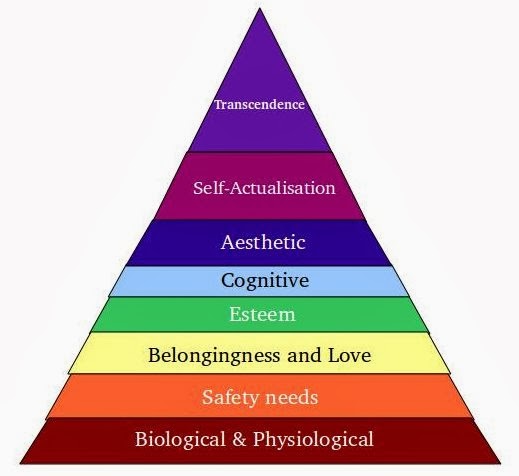
Can marketing scale Maslow’s pyramid to achieve transcendence? (courtesy of Prakash Advani)
What is the real purpose of your product or your brand?
Does it meet a customer need? Solve their greatest problem? Eliminate a nagging pain? Or help them to be more productive?
What if it could go far higher than that, and integrate itself with their life aspirations, values and beliefs?
From the 4 Ps to Brand Stories
For the longest time, marketing focused on the physical, functional and rational needs of consumers.
With the four Ps in mind – Product, Price, Place, and Promotion – marketing was perceived to be like a jigsaw puzzle. Every piece should fit logically with each other so that we can precisely segment, target and position our products to hit the bull’s eye of customer satisfaction.
As consumers grew more discerning, marketers realised that transactional modes of marketing isn’t enough.
Consumers demanded personal attention and care. This sparked the great move towards relationship marketing and service, accompanied by tools like Customer Relationship Management (CRM) systems, loyalty cards, reward points and their ilk.
This further shifted with the age of branding. Marketing progressed from product features and customer service to one dominated by brand personalities, identities, associations and allegiances.
Consumers bought brands, going beyond mere products and services. They embraced the carefully crafted promises and mantras conceived by master storytellers. They became members of a club who identify themselves by the logos and insignias they adorn.
Marketing under Seige
Unfortunately, not all is well. Big brands came under siege when their partner-in-arms big media started crumbling with the advent of social technologies.
Consumers no longer believed the corporate spiel issued by slick publicists and savvy marketers. The bigger the size of the ad, the bigger the skepticism it elicits.
Now, every claim, every boast, and every Unique Selling Proposition (USP) is put to the Google test. Nobody buys stuff without checking for 3rd party reviews and testimonials on forums, blogs, and social networks.
Transparency, authenticity, and trust became critical success factors.
To bridge the growing trust gap between companies and their prospects, marketing needs to reinvent itself.
It needs to reach deep within the soul of the company and its brands, and to connect deep-seeded beliefs and values with those of like-minded customers.
It needs to move beyond functional features, superficial relationships, and fancy symbols, to connecting and resonating richly and emphatically with kindred souls and spirits.
Introducing Transcendental Marketing
Enter Transcendental Marketing.
First coined by Fredrik Nordin, this new philosophy to marketing is described in his article as one associated with higher-order values that transcend self-interest.
Transcendental marketers would seek to “develop their customers and support their advancement towards achieving the highest level of Maslow’s hierarchy”.
In the world of transcendental marketing, companies adopt an “inside-out” approach to identify what their values and beliefs are. These ideologies are deep-rooted and tend to have a strong religious or spiritual footing.
Often they stem from their founders’ personal philosophies and life missions.
While a company’s transcendental beliefs may include “causes” like social equality, environmental protection, human rights, or fair trading, they are often deeply embedded and enmeshed in its DNA.
Corporate Social Responsibility or CSR isn’t just a catchy term to please stakeholders. Rather, it forms an essential part of how the organisation operates.
Products and services offered by such a firm are deeply entrenched with its enduring beliefs. Concerned with the intrinsic and altruistic motivations of consumers, such products and services may be socially, morally or environmentally conscionable.
When customers invest in a product or service, they feel like they’re contributing towards a larger social movement.
“Every dollar spent is like a dollar donated to a larger social movement” – Walter Lim
Like spiritual leaders, transcendental marketers seek to reach the hearts and minds of would-be believers. They encourage them to be a part of their community, and to subscribe to the brand’s mission while contributing to its cause.
Creating a sense of unity between producer and customer, transcendental marketing is more akin to a religious belief where brand advocates are acolytes.
Customers participate in rites and rituals which reinforce their allegiances to the brand. Campaigns feel less like advertisements and more like altar calls.
This sometimes results in strong polarising feelings, and possibly leads to “battles” between rival fan groups.
Examples of organisations which have embraced transcendental marketing include Apple, Harley Davidson, Marvel, Lady Gaga, Starbucks and the growing universe of K-Pop groups.
They have created “cult” brands that have drawn believers who not only wear their badges of ownership with pride, but see it as an integral part of their values, beliefs and lifestyles.
What are your views on transcendental marketing? Are there other examples of companies which have achieved this?


I just wanted to add a comment here to mention thanks for you very nice ideas. Blogs are troublesome to run and time consuming thus I appreciate when I see well written material. Your time isn’t going to waste with your posts. Thanks so much and stick with it No doubt you will definitely reach your goals! Have a great day!
A Social Media, Public Relations and Influencer Marketing Agency